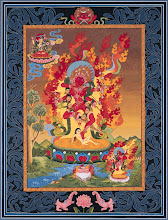One of the challenges that Tibetans and their supporters face is to reach a point where commentators like Huang Guan or Chinese officials or ordinary Chinese citizens can begin to draw parallels between their own mistrust of the way the government characterizes and responds to mass incidents, and the factors that lie behind the Tibetan mistrust of Beijing.
Saturday, August 15, 2009
Seeking truth from facts
Saturday, July 11, 2009
Uighurstan Power Plays
Friday, July 10, 2009
Uncle Zhou in Uighurstan
“Hai-er-ni-sha-han, a 66 year-old Uighur woman who had been struck in the head with a brick while riding on a public bus, is currently receiving medical treatment. Zhou Yong-kang visited her bedside, and leant over to carefully examine her wounds. He expressed his personal sympathies to her. Hai-er-ni-sha-han said that she has confident in the party and the government, believes that the malevolent goals of villains will not succeed, and that ‘our lives will be sure to improve.’ Zhou Yong-kang said to her: ‘You have indeed spoken well. What you said represents the common aspirations of the people of all ethnic groups in Xinjiang.’”
Thursday, July 9, 2009
Neo-colonialism with Chinese characteristics
For them, all minorities are fully — and only — Chinese citizens, and therefore must be loyal to the government and grateful for its largesse. There will never be much gratitude unless China’s leaders grant these groups real regional autonomy, guarantee freedom of religion, curb Han Chinese migration and stop their insulting rhetoric about underdeveloped minorities in need of help. But they won’t. So the unrest and discontent — at times exploding into the violence of the past few days — are bound to continue.He also does a good job of explaining the difference between ethnic "nationalities" such as Tibetans and Uighurs, vice the 50+ other minority groups in China - i.e. Hui, Zhang, etc. - a distinction that is frequently obscured by both Chinese leaders and others in making comparisons to ethnic politics in other countries, as well as comparisons among ethnic groups within China.
Tuesday, July 7, 2009
Seriously?!? Are these people crazy or just evil?
Meanwhile, for much of the afternoon, a mob of 1,000 mostly young Han Chinese holding cleavers and clubs and chanting "Defend the Country" tore through streets trying to get to a Uighur neighborhood until they were repulsed by police firing tear gas.
Panic and anger bubbled up amid the suspicion in Urumqi (pronounced uh-ROOM-chee). In some neighborhoods, Han Chinese — China's majority ethnic group — armed themselves with pieces of lumber and shovels to defend themselves. People bought up bottled water out of fear, as one resident said, that "the Uighurs might poison the water."
The outbursts happened despite swarms of paramilitary and riot police enforcing a dragnet that state media said led to the arrest more than 1,400 participants in Sunday's riot, the worst ethnic violence in the often tense region in decades.
Trying to control the message, the government has slowed mobile phone and Internet services, blocked Twitter — whose servers are overseas — and censored Chinese social networking and news sites and accused Uighurs living in exile of inciting Sunday's riot. State media coverage, however, carried graphic footage and pictures of the unrest _showing mainly Han Chinese victims and stoking the anger.




